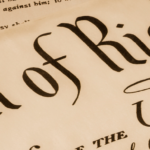Police Interrogation of Minors
Police interrogation of a minor might be illegal, depending on the circumstances.

Juveniles and Miranda Rights – When can the police interrogate a minor?
The Michigan State Police Department recently issued a legal update. They advised their troopers to consider a minor’s age when determining whether to give Miranda warnings to a juvenile suspect. Courts have waffled on what protections are necessary for police interrogation of a minor.
In J.D.B. v. North Carolina, J.D.B. was a 13- year-old, seventh-grade student suspected of breaking and entering and larceny. J.D.B. was removed from class and interviewed in a closed-door conference room by two police officers and two school administrators at his school. Before beginning the interview, the officers did not give him Miranda warnings, an opportunity to call his legal guardian, or tell him he was free to leave the room. Detectives interrogated J.D.B. bout the crimes, and he confessed his involvement. After J.D.B. confessed, an officer advised him that he could refuse to answer further questions and that he was free to leave. Asked whether he understood, J.D.B. nodded and provided additional information regarding the crimes and a written statement.
Two juvenile petitions were filed against J.D.B., charging him with breaking and entering and larceny. J.D.B.’s attorney moved to suppress his statements and evidence located due to those statements. The lawyer argued that the police interrogated J.D.B. while in custody and without being read his Miranda warnings; therefore, his statements were involuntary. The trial court denied the motion to suppress, stating that J.D.B. was not in custody at the interrogation and that his statements were voluntary. J.D.B. was adjudicated delinquent and later appealed to determine whether the police interrogation of a minor was lawful.

The U. S. Supreme Court reviewed the test for custody.
Whether a reasonable person in the suspect’s position would believe they were free to leave. The Court noted, in some circumstances, a reasonable child subjected to police questioning will feel pressured to answer questions even though a reasonable adult would feel free to go. During a police interrogation of a minor, a child would likely feel tremendous pressure and stress. The Court held that so long as a child’s age was known to the officer at the time of questioning or would have been objectively apparent to a reasonable officer, the child’s age must be included as part of the “custody analysis.” In addition, the Court noted this does not mean the child’s age will be a significant factor in every case, but officers must at least consider it.
Officers must consider a juvenile suspect’s age in determining whether they must give Miranda warnings to a juvenile during an interrogation. Additionally, officers must properly advise all in-custody suspects of their Miranda warnings before questioning or interrogating a minor.

Here is the big question: Why not just give Miranda every time a person is arrested or in custody?
Most defendants were not given Miranda warnings during the initial police investigation. People don’t realize that Miranda warnings are only routinely given on television and in the movies. The only time that police are required to provide Miranda warnings, including the interrogation of a minor, is when a suspect is in custody and being questioned, AKA interrogated. Michigan law defines “custody” as “whether a reasonable person in the suspect’s position would believe they were free to leave.” Courts bend over backward to say defendants in evidentiary hearings did not meet this “reasonable person” standard. What are the police so afraid of? They fear the constitution and liberty, so they don’t advise someone of their right to have a lawyer. If they weren’t concerned about doing something wrong, manipulative or deceptive, they wouldn’t care if a lawyer was present.
The fact is that many of the cases that we beat at trial by getting a charge reduced or a client found not guilty is because the police and prosecutors cheated, hid evidence, created evidence, or manipulated witness testimony. If everyone would do their job ethically and according to the rules, the system would work in the intended way. We know that the jails hold many wrongfully convicted people, and many guilty people go free. If law enforcement (police, prosecutors, and courts) consistently followed the rules, it would drastically reduce the ratio of wrongful convictions to accurate verdicts.

Juvenile and Young Adult Defense Attorneys
Until then, the defense team with LEWIS & DICKSTEIN, P.L.L.C. will work tirelessly to expose the lies, manipulations, and deception occasionally used by law enforcement officers, including false claims of fair treatment during police interrogation of a minor. The attorneys with LEWIS & DICKSTEIN, P.L.L.C. have decades of experience successfully defending children and young adults on felony and misdemeanor charges in courts throughout Michigan. We understand that a conviction can have a lifelong impact on a young person’s life and commit to doing everything reasonably possible to help them avoid a conviction and jail time.
Call us today at (248) 263-6800 for a free consultation or complete an online Request for Assistance Form. We will contact you promptly and find a way to help you.












